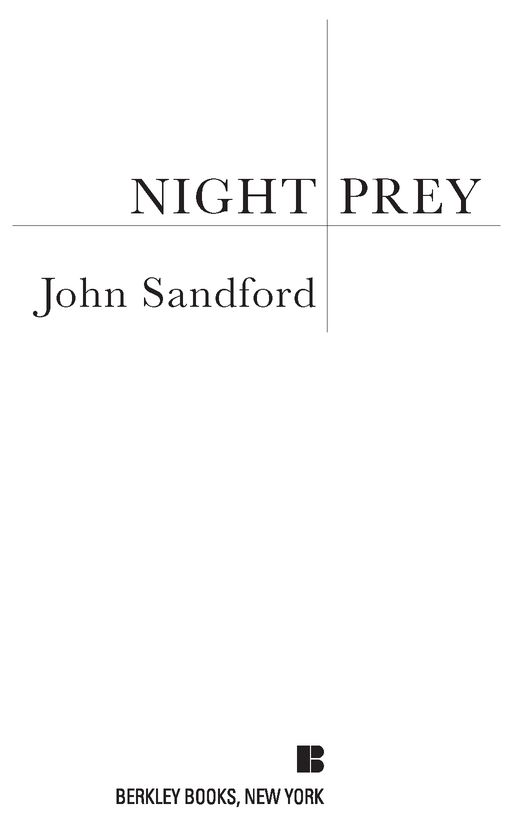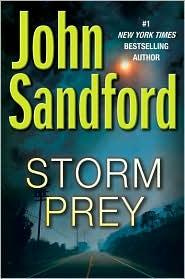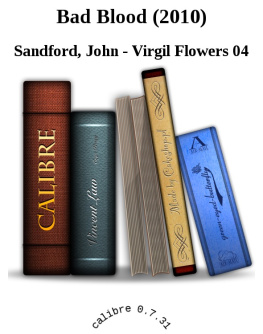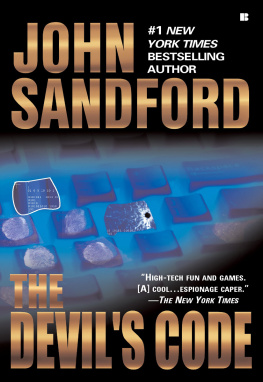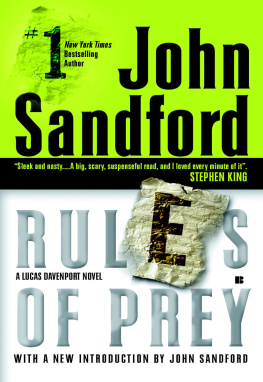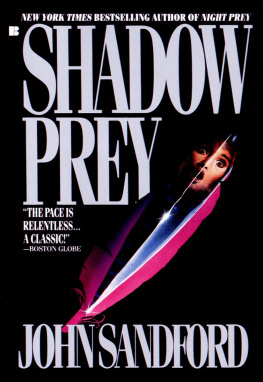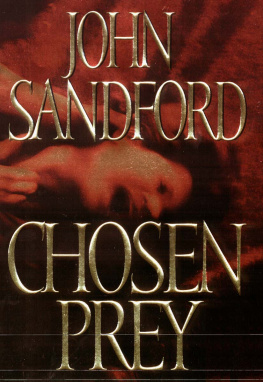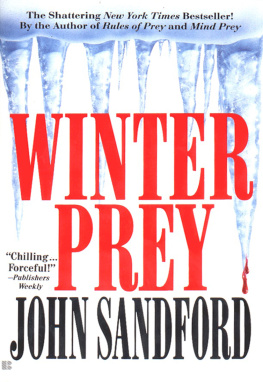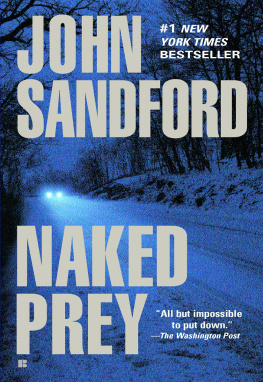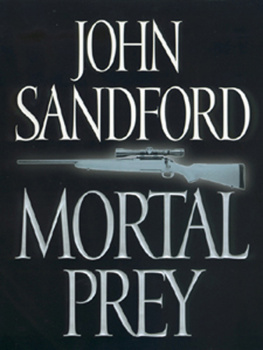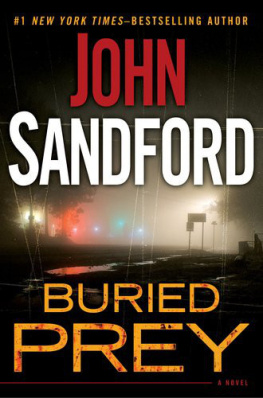Mr. Sandford knows all there is to know about detonating the gut-level shocks of a good thriller.
The New York Times Book review
NIGHT PREY
John Sandfords acclaimed Prey novels have taken readers into the minds of murderers and manhunters. Now his brilliant detective, Lucas Davenport, faces an equally brilliantand elusiveopponent. A madman who becomes obsessed with a beautiful womanand carves her initials into the flesh of his victims.
Night Prey sizzles... positively chilling.
St. Petersburg Times
Sandford builds a compelling counter-rhythm of suspense. Publishers Weekly
Sandford is in top form. Minneapolis Star Tribune
Praise for John Sandfords Prey novels
Relentlessly swift... genuinely suspenseful... excellent.
Los Angeles Times
Sandford is a writer in control of his craft.
Chicago Sun-Times
Excellent... compelling... everything works.
USA Today
Grip-you-by-the-throat thrills... a hell of a ride.
Houston Chronicle
Crackling, page-turning tension... great scary fun.
New York Daily News
One of the most engaging characters in contemporary fiction. The Detroit News
Positively chilling. St. Petersburg Times
Just right for fans of The Silence of the Lambs.Booklist
One of the most horrible villains this side of Hannibal.
Richmond Times-Dispatch
Ice-pick chills... excruciatingly tense... a double-pumped roundhouse of a thriller. Kirkus Reviews
THE NIGHT WAS warm, the twilight inviting: middle-aged couples in pastel shirts, holding hands, strolled the old cracked sidewalks along the Mississippi. A gaggle of college girls jogged down the bike path, wearing sweatsuits and training shoes, talking as they ran, their uniformly blond ponytails bouncing behind them. At eight, the streetlights came on, whole blocks at once, with an audible pop. Overhead, above the new green of the elms, nighthawks made their skizzizk cries, their wing-flashes like the silver bars on new first-lieutenants.
Spring was shading into summer. The daffodils and tulips were gone, while the petunias spread across their beds like Mennonite quilts.
Koop was on the hunt.
He rolled through the residential streets in his Chevy S-10, radio tuned to Country-Lite, his elbow out the window, a bottle of Pigs Eye beer between his thighs. The soft evening air felt like a womans fingers, stroking his beard.
At Lexington and Grand, a woman in a scarlet jacket crossed in front of him. She had a long, graceful neck, her dark hair up in a bun, her high heels rattling on the blacktop. She was too confident, too lively, moving too quickly; she was somebody who knew where she was going. Not Koops type. He moved on.
Koop was thirty-one years old, but at any distance looked ten or fifteen years older. He was a wide man with a sharecroppers bitter face and small, suspicious gray eyes; he had a way of looking at people sideways. His strawberry-blond hair was cut tight to his skull. His nose was pinched, leathery, and long, and he wore a short, furry beard, notably redder than his hair. His heavy shoulders and thick chest tapered to narrow hips. His arms were thick and powerful, ending in rocklike fists. He had once been a bar brawler, a man who could work up a hate with three beers and a mistimed glance. He still felt the hate, but controlled it now, except on special occasions, when it burned through his belly like a welding torch....
Koop was an athlete of a specialized kind. He could chin himself until he got bored, he could run forty yards as fast as a professional linebacker. He could climb eleven floors of fire stairs without breathing hard.
Koop was a cat burglar. A cat burglar and a killer.
KOOP KNEW ALL the streets and most of the alleys in Minneapolis and St. Paul. He was learning the suburbs. He spent his days driving, wandering, looking for new places, tracking his progress through the spiderweb of roads, avenues, streets, lanes, courts, and boulevards that made up his working territory.
Now he drifted down Grand Avenue, over to Summit to the St. Paul Cathedral, past a crack dealer doing business outside the offices of the archdiocese of St. Paul and Minneapolis, and down the hill. He drove a couple of laps around United Hospitals, looking at the nurses on their way to their special protected lota joke, that. He looked in at antique stores along West Seventh, drove past the Civic Center, and then curled down Kellogg Boulevard to Robert Street, left on Robert, checking the dashboard clock. He was early. There were two or three bookstores downtown, but only one that interested him. The Saint had a reading scheduled. Some shit about Prairie Women.
The Saint was run by a graying graduate of St. Johns University. Books new and used, trade your paperbacks two-for-one. Coffee was twenty cents a cup, get it yourself, pay on the honor system. A genteel meat-rack, where shy people went to get laid. Koop had been inside the place only once. Thered been a poetry reading, and the store had been populated by long-haired women with disappointed facesKoops kind of womenand men with bald spots, potbellies, and tentative gray ponytails tied with rubber bands.
A woman had come up to ask, Have you read the Rubaiyat?
Uh... ? What was she talking about?
The Rubaiyat of Omar Khayyam? I just read it again, she babbled. She had a thin book in her hand, with a black poetical cover. The Fitzgerald translation. I hadnt read it since college. It really touched me. In some ways its analogous to the poems that James was reading tonight.
Koop didnt give a shit about James or his poems. But the question itself, Have you read the Rubaiyat? had a nice ring to it. Intellectual. A man whod ask that questionHave you read the Rubaiyat?would be... safe. Thoughtful. Considerate.
Koop hadnt been in the market for a woman that night, but he took the book and tried to read it. It was bullshit. Bullshit of such a high, unadulterated order that Koop eventually threw it out his truck window because it made him feel stupid to have it on the seat beside him.
He threw the book away, but kept the line: Have you read the Rubaiyat?
KOOP CROSSED I - 9 4 , then recrossed it, circling. He didnt want to arrive at the bookstore until the reading had begun: he wanted people looking at the reader, not at him; what he was doing tonight was out of his careful pattern. He couldnt help itthe drive was irresistiblebut he would be as careful as he could.
Back across the interstate, he stopped at a red light and looked out the window at the St. Paul police station. The summer solstice was only two weeks away, and at eight-thirty, there was light enough to make out faces, even at a distance. A group of uniformed cops, three men, a couple of women, sat talking on the steps, laughing about something. He watched them, not a thing in his mind, just an eye....

